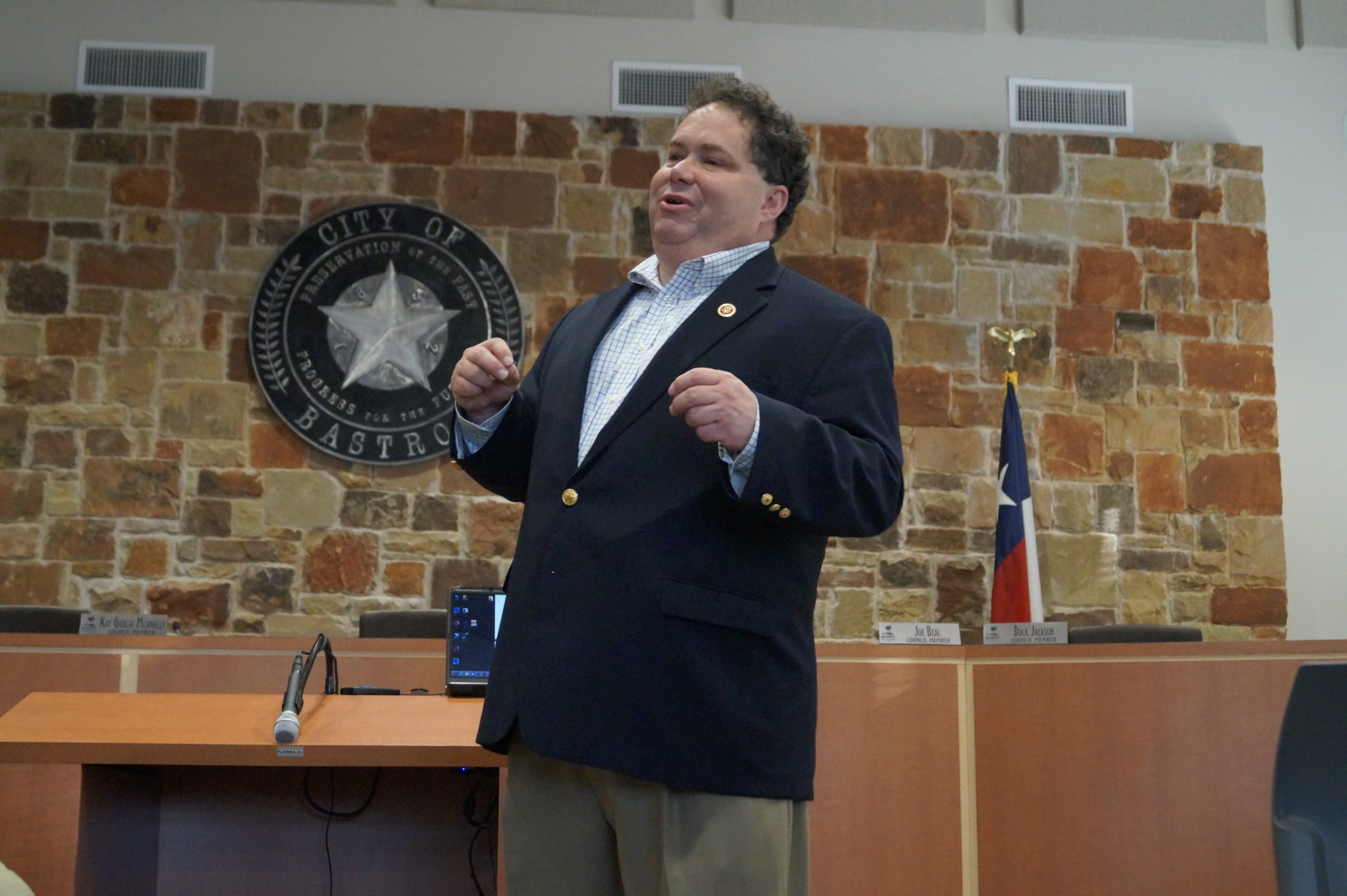
Blake Farenthold: ‘We’ve Got to Not be Angry Republicans’

Above: Blake Farenthold speaks at a town hall in Bastrop on Aug. 6, 2014.
August is the time for Congress to take a well-deserved vacation, which, in the unhappy world of congresspeople, means returning to their districts to be yelled at by constituents. Last year’s round of town halls were particularly bad in this regard. The House had been flirting with immigration reform, and the tea party was furious. At one town hall in Salado, Congressman John Carter, who’d been tasked by the House leadership with trying to draw up a bipartisan bill, was yelled into virtual submission by the Central Texas Tea Party.
You might expect, given recent events on the border, and the continuing malaise in Congress over immigration reform, that this year’s town halls would be just as heated. But on Wednesday night, at a town hall meeting in Bastrop held by Congressman Blake Farenthold (R-Corpus Christi), there wasn’t much fire. Still, the meeting proved to be a strong reminder of why Congress finds itself stuck in neutral on the subject, without much chance of improvement anytime soon.
There were plenty of off-the-wall constituents, like the woman who accused Central American kids of taking advantage of an anti-human trafficking law by falsely claiming they’d been abused. (Of course, the opposite is the case—there’s plenty of evidence the government isn’t properly shielding kids who’ve shown evidence of being trafficked.) One fellow, talking about the possibility of impeachment proceedings for Obama, employed language evocative of a lynching—letting the “noose” of scandals tighten around the president’s neck. One wanted to know why we weren’t building higher walls.
An older man in a Hawaiian shirt wanted to know about the IRS and Lois Lerner. Didn’t the administration’s recent scandals point toward high crimes and misdemeanors? It had gotten to the point where even he, a free man in Bastrop, was afraid of speaking out against Obama. He offered this in the middle of his town’s city hall, to a congressman who agreed with them, then added, of liberals: “You gotta remember, half the population has an IQ of less than a hundred.”
When Carter got in trouble last year, he did so because he tried to set his constituents straight on a lot of the issues they were most angered by. That might have been the noble thing to do, but it may not have been the best idea. Farenthold doesn’t bother to engage with a lot of the talking points constituents leave at his feet—he deftly sidesteps them and talks about something more comfortable. It’s a smart thing to do, even if it may leave some of the voters with the impression that he agrees with them when he hasn’t.
“We’ve got to not be angry Republicans,” he told the crowd. Afterward, Farenthold continued to strike a moderate tone to the two reporters present. Last year, “advocates of both sides in the immigration debate were really turning up the fire, and we came out of August last year further apart than we began.”
On the prospects of immigration reform: It’s “pretty obvious that’s not going to happen in the House.” He called for the Senate to take up the bill the House recently passed, which would undo DACA—Obama’s temporary relief for young undocumented people, aka Dreamers—as well as a host of other measures. Farenthold said that politics involved negotiation, and that Harry Reid was to blame for not taking up the House bill. But the House legislation, which would expose more people to deportations, is lights-years away from the president’s proposal. It’s virtually impossible to imagine a compromise between the two.
For years, immigration reform has had a chicken-and-egg problem. Some say that the border has to be secured before anything else happens. But comprehensive immigration reform, with a guest worker program and legal status for those here illegally, would ease conditions on the border. And besides, it’s not clear that the border can ever really be “secured” to anyone’s satisfaction.
I ask Farenthold: Is demanding that border security come first a poison pill? “I think it’s exactly the opposite. What I pointed out in the town hall is that Americans feel betrayed because Reagan told them that we’d secure the border back when he did the first amnesty. He didn’t, and now we’re in the exact same boat we were in when the Reagan policy took effect.”
He adds: “Let’s get back to integrity with the American people and secure the border. And I guarantee you, the tempers will come down. This whole comprehensive immigration thing just drives me crazy.”
Farenthold says he supports guest worker programs, and wants Congress to break immigration reform into smaller bills. There are lots of things that both sides agree on. At the same time, he admitted, if Congress breaks reform up into small packages based on those areas of common consensus, “then there’s not the coalition to do something about the 11 million people not lawfully present in the United States.”
What does securing the border mean from a policy perspective? Is there a metric? Would, for example, more apprehensions along the border mean the border is getting more secure, or less secure? “The trick is coming up with a specific measurable result,” he says. Here, he seems to get closer to the truth. It’s mostly about perception.
“I’m talking in general terms about the American people believing the border is secure. I don’t know what it’s going to take to convince the American people the border is secure, but I certainly know a child and her grandmother being able to get across is not it.”
But if perception is at the root of the impasse, many Republicans aren’t helping. By taking trips on Rio Grande gunboats and emphasizing disease and crime risks, Republican politicians like Rick Perry are exacerbating the perception of insecurity.
People are coming here illegally because they can’t come here legally. They might be coming to work, or they might be coming to join family members already living here. A failure to tackle immigration reform increases the number of people forced to attempt an illegal crossing, and incentivizes human trafficking. Which, in turn, is proof to the American voters Farenthold is talking about that the border isn’t secure, and reinforces the unwillingness to tackle immigration reform. Status quo ante, ad infinitum.


